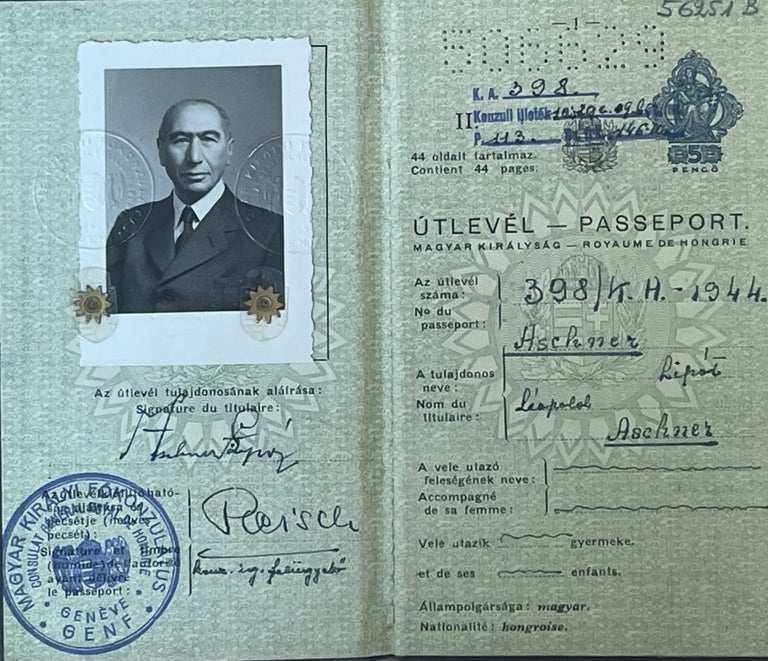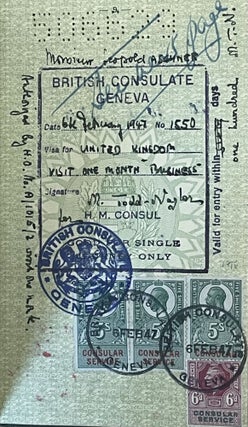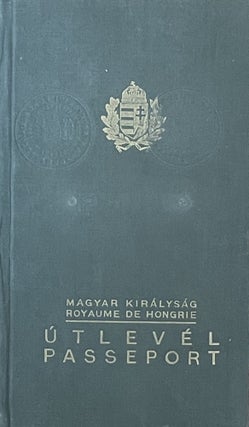Leopold Aschner’s Hungarian Passport, Issued in Switzerland, December 1944.
Issued and signed in Switzerland, Geneva by the Consulate General of the Kingdom of Hungary, December 28, 1944. Illegible signature of the Hungarian Consul, the official stamp of the consulate. Contains 44 numbered pages. With visa and related stamps (Switzerland, UK, France, The Netherlands, US). Interior als. Very slightly rubbed at the extremities otherwise in fine condition.
Hungarian passport, issued by the Swiss Consulate of the radical anti-semite, far-right nationalist Arrow Cross Party for Leopold Aschner, the Jewish-Hungarian tycoon, after being released from the Mauthausen concentration camp, and escorted to Switzerland, in exchange for a ransom on 100,000 Swiss francs.
During World War II Hungary was a member of the Axis powers. After the German defeat at Stalingrad in February 1943, Hungarian political leaders recognized that Germany would likely lose the war and tried to negotiate a separate armistice for Hungary with the Western Allies. To prevent these efforts, German forces occupied Hungary in March 1944, which had a crucial effect on the fate of the Hungary Jewry too. The ghettoization started a month following the occupation, and the deportation to Auschwitz-Birkenau began in May 1944. One of the first actions of the German invaders was to locate, procure and occupy the properties of wealthy Jews of Budapest, while the owners were taken into “protective custody” to Vienna.
The holder of the present passport, Leopold Aschner, the CEO of the Tungsram Co. was among the first consignment of Hungarian prisoners transferred to Vienna into the aforementioned “protective custody” on March 28, 1944, together with nearly fifty captives of Jewish industrialists, bankers, and prominent public figures of known anti-German sentiment. Aschner’s hillside villa was immediately occupied by Adolf Eichmann who was in charge of deporting the Hungarian Jewry.
From Vienna, the prisoners were taken to Oberlanzdorf work camp, and on May 5 Aschner was transferred to Mauthausen. He was held there until a ransom of 100,000 Swiss francs was paid for his release by the major shareholders of the Tungsram Co. The exchange was allegedly approved by Heinrich Himmler and was conducted by Himmler’s economic specialist, a controversial SS Officer, Kurt Becher (known also as the possible mastermind of the Hungarian Gold Train and the Nazi negotiator of the Kastner train). Initially, Becher demanded an exorbitant ransom of one million Swiss francs, but through the negotiation, with the representatives of the American War Refugee Board, Tungsram Co., and Raoul Wallenberg, the sum was reduced to 100,000 francs.
Eventually, in mid-December, a so-called Fremdenpass (an ID and travel pass for Non-Germans living in Germany; not presented here) was issued for Aschner in Vienna, allowing him to cross the German border at Konstanz to Switzerland, where he was equipped with the present Hungarian passport, delivered by the Hungarian Consulate of the radical anti-semite, far-right nationalist Hungarian government, in Geneva on December 28, 1944. With these documents, Aschner survived the Holocaust and stayed in Geneva until June 1947 when he moved back to Budapest and acted as the vice-chairman of the board of Tungsram until his death in 1952.
Leopold (Lipót) Aschner (1872—1952) was the chief executive officer of Tungsram Co., one of the world's greatest light bulb and radio tubes factory in the 1930s. Aschner started his career at the company as a minor administrator and rapidly rose to the top of management. First worked as chief clerk later the deputy director and from 1917 the technical manager of the Lamp Manufacturing Department. In this position, he was able to increase the production volume considerably, and soon he was appointed to the position of chief executive officer of the Department. Under his management, the company carried out a substantial modernization program, and within a few years, Tungsram became one of the world's leading companies in the industry. In the early 1920s, Aschner initiated negotiations with the General Electric Company (GE) thus the two companies shared technologies and licenses related to incandescent lamps. Aschner was one of the founders of the Phoebus cartel, the first global industrial cartel, which attempted to standardize the life expectancy of light bulbs and to control their worldwide manufacture and sale.
Literature: Breitman, R.: U.S. intelligence and the Nazis. Cambridge; New York: Cambridge University Press, 2005.; Hidvégi, M.: The Incandescent Lamp Cartel and Economic Nationalism. Paper for the EBHA-Confernce; 13–15th September 2007, Geneva, URL: http://www.ebha.org/ebha2007/pdf/Hidvegi.pdf; Jeney, K., Gáspár, F.: The history of Tungsram, 1896–1945. History Committee of Tungsram Co. Limited, 1990.; Rojkó, A.: Aki a korát megelőzte. Aschner Lipót élete. Budapest: Kossuth, 2011.; Szita, Sz., Lambert, S.: Trading in lives? Operations of the Jewish Relief and Rescue Committee in Budapest, 1944–1945. Budapest; New York: Central European University Press, 2005.
Price: €15,000.00



